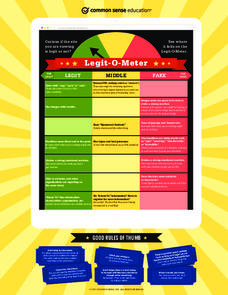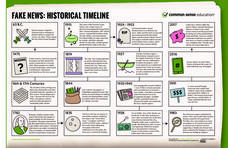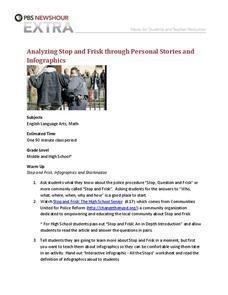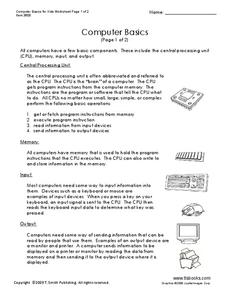iCivics
NewsFeed Defenders
How can people learn to spot viral deception? Players do just that with the NewsFeed Defenders media literacy game. Scholars choose avatars and the focus of their news feeds: student life, health and wellness, or sports and...
Federal Trade Commission
A Smarter Consumer
How can understanding advertisements make people better consumers? With the fourth and final instructional activity from the Admongo series on advertising, scholars reflect on some of the questions they may ask about an ad before making...
Federal Trade Commission
Ad Creation
How would someone market a new cereal to space aliens? Using the third lesson from a four-part Admongo series on advertising, pupils learn about persuasive techniques companies use to convince consumers to purchase their products. As a...
Federal Trade Commission
Ad Targeting and Techniques
What techniques do advertisers use to reach a target audience? Pupils discover the answer with the second of four Admongo lesson plans. Scholars learn about the most common strategies advertisers use to convince people to buy something....
Federal Trade Commission
Ad Awareness
Movie theaters, shopping malls, television, the Internet ... no matter where people go, they are inundated with advertisements. Scholars discuss the topic of ad awareness using the first of four Admongo lessons about advertising. Pupils...
Common Sense Media
Legit-O-Meter
Pop-ups, banner ads, grammar mistakes ... these are all signs of an untrustworthy website. With the handy Legit-O-Meter poster, scholars can now double-check their sources to ensure accurate, reliable information. The color-coded poster...
Common Sense Media
Fake News: Historical Timeline
In 1874, The New York Herald falsely claimed that several animals escaped from the Central Park Zoo, and panic ensued. Using the helpful infographic, pupils discover more instances of fake news throughout history, from as far back as 63...
Newseum
Editorials and Opinion Articles
Reading the news is fun, and that's a fact! With the lesson plan, scholars differentiate between fact and opinion as they read editorial articles. They complete a worksheet to analyze the information before writing their own editorials...
Newseum
Putting the Consumer's Questions to Work
Who, what, when, where, why, and how are good questions to ask when evaluating a source. First, scholars find two sources of information relating to a chosen topic. Next, pupils complete a worksheet to gauge the source's credibility....
Newseum
Can I Trust the Creators?
It's easy to find information at the click of a mouse, but is it trustworthy? Pupils learn about the E.S.C.A.P.E. acronym for evaluating sources. Next, learners read a news story and evaluate its sources to determine credibility. Last,...
Newseum
E.S.C.A.P.E. Junk News
Fair, balanced, and reputable information? There's an acronym for that! Scholars learn the E.S.C.A.P.E. method for evaluating news sources. Then, pupils work in small groups to read and analyze a news story and discuss the activity to...
Newseum
Slanted Facts and Slippery Numbers
The Internet is known as the information superhighway, but sometimes it's hard to know when to hit the brakes on unreliable sources. Using a well-rounded lesson plan, pupils read and summarize articles about the gender pay gap and...
Newseum
Evidence: Do the Facts Hold Up?
Sometimes it's hard to escape bad information! Pupils learn the E.S.C.A.P.E. method for evaluating news sources and complete a worksheet to assess a news article using their new skills.
American Bar Association
News Literacy Model Curriculum in Social Studies
Scholars investigate news literacy in the twenty-first century. They use technology, legal decisions, writings, and digital privacy to analyze the topic. Using what they learned, a group assignment looks into both the challenges and...
PBS
Analyzing Stop and Frisk Through Personal Stories and Infographics
How much can you learn about an important topic from a single image? High schoolers analyze an infographic that represents the number of stops performed during the Stop and Frisk police procedure. After building background information...
University of Wisconsin
BEAM: Background, Exhibit, Argument, Method
Thinking of assigning a research paper? Get writers off on the right foot with a lesson that introduces the BEAM research model. Writers brainstorm the background of their topic, explicate the aspects of their topic, consider the...
Indiana University Libraries
Web Page Evaluation
Invite your learners to research three different websites that pertain to a topic focused on in your syllabus. Learners fill out a chart by answering questions about each site. Then, they compare how useful the sites are to one...
T. Smith Publishing
Computer Basics for Kids Worksheet
This informational reading worksheet can be used in your literacy or computer class. Students learn the basic components of computers then test their knowledge with multiple choice and fill-in-the-blank questions.
Curated OER
Lesson Plan: How Coyote Came to Shuffle Off to Buffalo
Creative kids read, discuss, play-act, and sketch to examine the cultural significance of Old Man Coyote. They listen to several stories involving Coyote, analyze the Harry Fonseca painting Shuffle Off to Buffalo, and write Coyote...
Curated OER
Teacher Notes
Gathering information, distinguishing between arguments, preparing an oral presentation; these skills are fostered as 10th graders explore aspects of global trade and politics. They use the Internet to gather information about NATO, The...
Sharp School
Career Project 2
Help your pupils find some direction with a career research project. Individuals research three careers, using the included graphic organizers to record their findings. They then create a visual aid on a computer and present their...
Curated OER
The Student Cafateria as the "Leafy Chestnut Tree"
Students examine the difference between "news" of earlier periods, and "news" as we know it today. They then go out into the school common areas and analyze news from the perspective of word-of-mouth storys and discuss what they can...
Curated OER
Thematic Poetry Videos
Students pen poetry regarding global issues. In this information literacy lesson, students research global issues and use their findings to compose poems regarding the topics. Students create videos that include images and the the text...
Curated OER
Sorting
Students practice sorting books. In this sorting lesson, students play the Flood Game on the PBS web site. With knowledge of the sorting system used by libraries, students sort small numbers of books using categories devised by their...

























